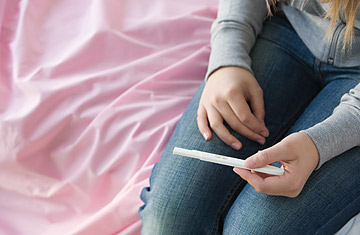
(11 of 14)
Infants that escape the medical hazards of having a teenage mother do not always manage to negotiate the psychological and social perils. Desirée Bell, 19, of New York City, had her first son at age 15 and her second the following year. Her elder son Eddie has a learning disability and was almost autistic as an infant. Bell, who has managed heroically to complete high school and secure a good job with the city, blames herself for his problems. "I hated the fact that I was pregnant," she recalls. "I was resentful of my unborn child. I used to punch myself in the stomach. Poor Eddie," she muses, "the first year I wouldn't play with him. He didn't talk until he was nearly two; he would just grunt. I would say, I traumatized my own son."
Desirée Bell has recognized her error and tried to give her son the extra attention he needs. Not all teenagers do. According to the Children's Aid Society in New York City, one of the oldest family agencies in the country, a large number of babies delivered to teenage mothers wind up in foster care. "Teenagers get excited about this little, adorable person that's all theirs," explains Barbara Emmerth of the New York City-based Citizens' Committee for Children, "but when the kid is in the terrible twos and the mother wants to go out on dates instead of taking care of the little monster, they change their minds."
Often the state must intervene in cases where abuse or neglect is suspected. Two-year-old Ana Marie seemed to be perpetually falling and hurting herself. "I didn't pay her enough attention," admits her mother Kim Adalid, 19, who also has a three-year-old son and expects a third child in January. After one of Ana Marie's mishaps, Kim took her daughter to a doctor, who quickly discovered that the child's arm was broken. Believing that the girl had been neglected (a charge that Kim vigorously denies), the doctor filed a report with the California courts. Ana Marie was taken away and placed with a temporary guardian.
Such interventions come at a considerable cost. In Illinois, state officials calculated that teenage pregnancy cost $853 million in medical care, day care, welfare and other social programs last year. It has been estimated that overall, the U.S. spends $8.6 billion on income support for teenagers who are pregnant or have given birth.
Most programs addressing the problem of teen pregnancy are directed at the group easiest to identify and help: adolescents who are already pregnant or have given birth. The goals: to ensure that the girls obtain adequate prenatal care, continue their education and learn how to be good parents. Providing prenatal care has become a bigger problem since 1982, when the Reagan Administration reduced the appropriation for the Feeding Program for Women, Infants and Children, which offers nutritional supplements and medical care to low-income expectant mothers. The cuts, say critics, will prove expensive in the long run, because caring for undersize, ailing infants through Medicaid is many times as costly as preventive prenatal measures. In recent years, private organizations and local governments have attempted to fill the gap left by Wiccutbacks. San Francisco's TAPP, a model program that the state plans to extend to other cities, has helped reduce the incidence of low-birth-weight infants to about 4% among the teenagers it counsels, against a national average of 17%.
